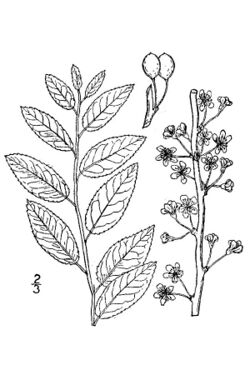Biology:Prunus gracilis
| Prunus gracilis | |
|---|---|

| |
| 1913 illustration[1] | |
| Scientific classification | |
| Kingdom: | Plantae |
| Clade: | Tracheophytes |
| Clade: | Angiosperms |
| Clade: | Eudicots |
| Clade: | Rosids |
| Order: | Rosales |
| Family: | Rosaceae |
| Genus: | Prunus |
| Subgenus: | Prunus subg. Prunus |
| Section: | Prunus sect. Prunocerasus |
| Species: | P. gracilis
|
| Binomial name | |
| Prunus gracilis Engelm. & A.Gray
| |
| Synonyms | |
|
Prunus normalis Small | |
Prunus gracilis, called the Oklahoma plum,[3][2] sour plum, and sand plum, is a species of Prunus native to the south-central United States.
Description
Prunus gracilis grows up to 1.8 metres (6 feet) tall, has five-petaled leaves, and fruits ripen June–August.[4] It grows in clusters and thickets.[5] It is hermaphroditic and pollinated by insects.[2]
Taxonomy
The specific epithet Gracilis refers to 'slender branches'.[6]
Distribution and habitat
It is natively found in various states of the United States, including Alabama, southwestern Arkansas, southeastern Colorado, Kansas , northwestern Louisiana, eastern New Mexico, Oklahoma, and Texas .[2][7][8][9]
It is found growing in fence rows, open woodlands, woodlands edge, forest openings, hillsides, slopes, sandy roadsides, upland thickets and waste places. It is normally found at 100–1,300 m (330–4,270 ft) above sea level.[2]
Uses
Its red fruits are considered poor for eating, but Native Americans dried them for consumption during winter.[10]
References
- ↑ illustration published in Britton, N.L., and A. Brown. 1913. An illustrated flora of the northern United States, Canada and the British Possessions. Vol. 2: 323.
- ↑ 2.0 2.1 2.2 2.3 2.4 Pollard, R.P.; Rhodes, L.; Maxted, N. (2016). "Prunus gracilis". IUCN Red List of Threatened Species 2016: e.T50403541A50673957. doi:10.2305/IUCN.UK.2016-2.RLTS.T50403541A50673957.en. https://www.iucnredlist.org/species/50403541/50673957. Retrieved 12 November 2021.
- ↑ "Prunus gracilis". Natural Resources Conservation Service PLANTS Database. USDA. https://plants.usda.gov/core/profile?symbol=PRGR. Retrieved 14 October 2015.
- ↑ "Prunus gracilis". Lady Bird Johnson Wildflower Center. http://www.wildflower.org/plants/result.php?id_plant=PRGR.
- ↑ Wright, William Franklin (1915). Native American species of Prunus. Washington, DC: United States Department of Agriculture. p. 58. https://books.google.com/books?id=IKQUAAAAYAAJ&q=prunus+gracilis&pg=PA58.
- ↑ "Prunus gracilis Engelm. & Gray". Oklahoma Biological Survey, University of Oklahoma. http://www.biosurvey.ou.edu/shrub/prun-gra.htm.
- ↑ {{citation | mode = cs1 | title = Prunus gracilis | work = Germplasm Resources Information Network (GRIN) | url = | publisher = [[Organization:Agricultural Research ServAgricultural Research Service (ARS), United States Department of Agriculture (USDA) | access-date = December 30, 2014 }}
- ↑ Biota of North America Program 2014 county distribution map
- ↑ "USDA Plants Database". https://plants.usda.gov/core/profile?symbol=PRGR.
- ↑ "Oklahoma Plum, Sour Plum, Sand Plum". Texas A&M University. http://aggie-horticulture.tamu.edu/ornamentals/nativeshrubs/prunusgracil.htm.
External links
- "Prunus gracilis". http://www.pfaf.org/user/Plant.aspx?LatinName=Prunus+gracilis.
- photo of herbarium specimen at Missouri Botanical Garden, collected in Republic of Texas in 1844
Wikidata ☰ Q577883 entry
 |

